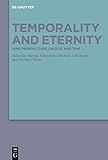Temporality and Eternity : Nine Perspectives on God and Time / ed. by Marcus Schmücker, Michael T. Williams, Florian Fischer.
Material type: TextPublisher: Berlin ; Boston : De Gruyter, [2022]Copyright date: ©2022Description: 1 online resource (VIII, 220 p.)Content type:
TextPublisher: Berlin ; Boston : De Gruyter, [2022]Copyright date: ©2022Description: 1 online resource (VIII, 220 p.)Content type: - 9783110698008
- 9783110698244
- 9783110698190
- online - DeGruyter
- Issued also in print.
| Item type | Current library | Call number | URL | Status | Notes | Barcode | |
|---|---|---|---|---|---|---|---|
 eBook
eBook
|
Biblioteca "Angelicum" Pont. Univ. S.Tommaso d'Aquino Nuvola online | online - DeGruyter (Browse shelf(Opens below)) | Online access | Not for loan (Accesso limitato) | Accesso per gli utenti autorizzati / Access for authorized users | (dgr)9783110698190 |
Frontmatter -- Preface -- Contents -- Introduction -- Temporal and timeless deity -- From divine timemaker to divine watchmaker -- Time’s arrow, relativity and God’s eternity: From the limitedness of creatures to the asymmetric structure of the worldline -- God, the grandfather of time: Time and the absolute in the thought of Philo of Alexandria -- The Muslim theologian Ibn Taymiyyah on God, creation and time -- Historical eternity: The approaches of Wolfhart Pannenberg and Hans Urs von Balthasar -- On the relation between God and time in the later theistic Vedānta of Madhva, Jayatīrtha and Veṅkaṭanātha -- Analytic philosophy of time in Early Modern India -- Non-persistence in time: A Buddhist account of intrinsic nature -- Contributors -- Authors/Persons -- Works -- Key-terms
restricted access online access with authorization star
http://purl.org/coar/access_right/c_16ec
Is time a creation of God? How can God be considered eternal, if he is responsible for the existence of time? Is God temporal or is he timeless? The relationship between God and time has been an object of inquiry in philosophical and theological traditions around the world for centuries. This volume takes up these and other questions, presenting a range of answers not only as brought forth in European philosophical traditions and in early Christianity, Judaism and Islam, but also positions taken by mediaeval Indian theologians and in the influential traditions of early Buddhism. Traditionally, discussions have focused on questions such as whether time is a necessary concomitant of God’s existence, or whether time should be identified with God. But there is a further question: did these traditions develop their own unrelated and independent view of God and time? Or are there similarities in their reflections? This volume, with contributions of scholars from various relevant fields, offers a novel approach to these inquiries. When taken as a whole, it provides new momentum to contemplation on an age-old enigma.
Issued also in print.
Mode of access: Internet via World Wide Web.
In English.
Description based on online resource; title from PDF title page (publisher's Web site, viewed 01. Dez 2022)


